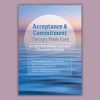Acceptance & Commitment Therapy Made Easy: ACT for PTSD, Anxiety, Depression & Personality Disorders By Daniel Moran
$99.00 Original price was: $99.00.$23.10Current price is: $23.10.
Acceptance & Commitment Therapy Made Easy: Act for PTSD, Anxiety, Depression & Personality Disorders by Daniel Moran – Digital Download!

Acceptance & Commitment Therapy Made Easy: ACT for PTSD, Anxiety, Depression & Personality Disorders By Daniel Moran
Overview

Acceptance & Commitment Therapy Simplified: ACT for PTSD, Anxiety, Depression, and Personality Disorders by Daniel Moran
In today’s fast-paced world, where mental health challenges are becoming more prevalent, psychological struggles such as post-traumatic stress disorder (PTSD), anxiety, depression, and personality disorders have gained significant attention. These conditions can create immense distress for individuals, making it imperative for mental health professionals to have reliable tools to address them effectively. Daniel J. Moran’s book, Acceptance & Commitment Therapy Made Easy: ACT for PTSD, Anxiety, Depression, & Personality Disorders, offers both hope and practical solutions. This guide not only simplifies the concepts of Acceptance and Commitment Therapy (ACT) but also equips clinicians with actionable techniques to help clients navigate their psychological challenges. Through this book, we’ll explore the foundational principles of ACT, its application, and how it can empower individuals facing mental health struggles.
An Introduction to ACT and Its Core Principles
ACT stands out in psychological treatment for its distinctive approach, emphasizing mindfulness and acceptance. Instead of encouraging individuals to suppress or avoid their emotions, ACT guides them to face and embrace their thoughts and feelings, thus promoting psychological flexibility. This flexibility is particularly essential for individuals with PTSD, who often cope by avoiding distressing emotions. Moran teaches how embracing these emotions rather than avoiding them leads to growth and empowerment.
A powerful metaphor Moran uses is comparing the mind to a “fuse box.” When overwhelming emotions or traumatic memories build up, it’s like a fuse blowing, causing individuals to avoid triggering situations. However, ACT allows people to reset this fuse by confronting their fears and fully engaging with their emotions, ultimately regaining control over their lives. By changing the way clients view their struggles, ACT enables them to develop healthier ways of managing psychological distress.
Moran includes real-life case studies that demonstrate the effectiveness of ACT principles. These examples underscore how confronting avoidance behaviors and engaging with emotions can lead to significant transformations. For therapists, these case studies provide concrete insights into applying these principles in clinical practice.
The Six Essential Elements of ACT
ACT is based on six core processes that together help individuals enhance their psychological well-being and promote healing: acceptance, cognitive defusion, being present, self-as-context, values, and committed action. These processes work in harmony, fostering resilience and growth.
-
Acceptance: Encourages clients to welcome their feelings instead of fighting them. The process is like navigating a river; struggling to fight the current leads to exhaustion, while allowing oneself to flow with it brings peace.
-
Cognitive Defusion: Involves distancing oneself from negative thoughts. Just as clouds drift through the sky without altering its essence, thoughts too pass by without defining a person’s identity.
-
Being Present: Focuses on mindfulness. Clients learn to anchor themselves in the present, cultivating awareness of their thoughts, feelings, and surroundings, much like a tree standing firm in the wind.
-
Self-as-Context: Encourages clients to see their sense of self as more than just their thoughts and feelings. By stepping back and observing their internal experience, individuals gain a broader understanding of their identity.
-
Values: Identifying core values helps clients make decisions based on what truly matters to them. This fosters a sense of purpose and drives action toward meaningful goals.
-
Committed Action: Focuses on taking concrete steps toward achieving goals based on personal values. Clients are guided to take actionable steps that reinforce their sense of agency.
By weaving these processes into therapy, Moran enables clinicians to enhance their therapeutic effectiveness. His clear and accessible explanations of these concepts make them practical for use in therapy, especially when treating conditions like PTSD, anxiety, depression, and personality disorders.
ACT in Therapy: Practical Implementation
What sets Moran’s book apart is that it doesn’t just present theoretical frameworks but also provides real exercises and case studies that clinicians can directly apply in therapy. These practical exercises empower professionals with easy-to-use tools that can have an immediate impact.
One such exercise involves helping clients visualize their fears as tangible objects they can manipulate. This technique of cognitive defusion allows individuals to externalize their worries, recognizing that their fears don’t define who they are. This externalization helps them detach from the intensity of these emotions, fostering healthier emotional responses.
Moran also highlights the importance of creating a compassionate and safe environment for therapy. When clients feel emotionally secure, they are more likely to open up and engage with their distressing experiences. This sense of safety is critical for clients to explore their thoughts and emotions freely.
Additionally, Moran outlines structured session goals that therapists can follow, ensuring that each session remains focused and purposeful. By clearly defining the objectives of each therapy session, clinicians can maintain a steady course in helping their clients achieve meaningful progress.
Mindfulness and Acceptance: The Cornerstones of ACT
Mindfulness and acceptance are central to ACT and set it apart from other therapeutic methods. Moran emphasizes that clients facing trauma, anxiety, or depression must first acknowledge and accept their emotions, rather than resisting them. Acceptance is not about passively giving up but about actively engaging with one’s emotions to foster growth.
Through mindfulness, individuals learn to observe their thoughts and emotions without judgment. This practice can help reduce the intensity of negative feelings and provide a greater sense of control. For example, a client might focus on their breathing, creating a pause between their thoughts and emotional reactions.
Research supports the effectiveness of mindfulness in reducing anxiety and depression. For example, a study in the Journal of Clinical Psychology found that individuals participating in mindfulness-based interventions experienced significant improvements in their mental health, including better life satisfaction.
Moran’s focus on mindfulness and acceptance aligns with broader psychological research, reinforcing the efficacy of ACT in promoting emotional well-being. By incorporating these practices into therapy, clinicians help clients develop skills to better manage life’s challenges.
Addressing Personality Disorders and Comorbid Conditions with ACT
Moran’s approach is particularly beneficial for individuals with personality disorders, who often face significant emotional distress and interpersonal challenges. ACT provides a framework for understanding and addressing the unique features of personality disorders, such as rigid thinking patterns and avoidance behaviors.
For example, individuals with borderline personality disorder often experience emotional instability. ACT helps these clients accept their emotions, instead of impulsively acting on them. By embracing their feelings and making thoughtful choices, they can improve their relationships and decision-making processes.
The flexibility of ACT allows clinicians to tailor treatments to meet the specific needs of individuals, providing personalized care. Studies have shown that ACT can significantly reduce symptoms of personality disorders and improve overall emotional functioning.
Comparing the Effectiveness of ACT and Traditional Therapies
To fully appreciate the value of Moran’s guide, it’s helpful to compare ACT with more traditional therapeutic methods, such as Cognitive Behavioral Therapy (CBT). While CBT has been a standard in mental health care, ACT offers distinct advantages due to its emphasis on mindfulness and psychological flexibility.
| Feature | ACT | CBT |
|---|---|---|
| Focus | Acceptance of emotions | Altering negative thought patterns |
| Mindfulness | Central to the process | Minimal focus |
| Flexibility | Encourages adaptability | Structured approach |
| Application | Broad (PTSD, anxiety, depression, personality disorders) | Primarily for anxiety and depression |
| Goal | Value-based living | Symptom reduction |
This comparison highlights how ACT offers a more holistic approach, making it especially effective for certain populations. By understanding the strengths of both therapies, clinicians can select the approach that best fits their clients’ needs, guided by Moran’s insights.
The Role of Empathy in Effective Therapy
Moran’s work emphasizes the importance of empathy in building a strong therapeutic relationship. Acknowledging the profound impact that trauma and distress have on clients allows therapists to create a safe and understanding environment where clients feel validated and supported. This empathetic approach enhances the therapeutic process and aligns seamlessly with ACT’s principles of acceptance and mindfulness.
Each therapy session becomes an opportunity for connection, enabling clients to feel heard and understood. Moran also underscores the value of self-compassion, reminding clients of their inherent worth despite their struggles. This focus on self-acceptance helps clients develop healthier coping strategies and fosters long-term healing.
By integrating empathy into ACT, therapists create a nurturing environment that supports clients in confronting their fears and achieving transformative change.
Final Thoughts
Daniel J. Moran’s Acceptance & Commitment Therapy Made Easy: ACT for PTSD, Anxiety, Depression & Personality Disorders is an indispensable resource for mental health professionals. The actionable strategies and principles outlined in the book help clinicians empower their clients to face psychological challenges with resilience and confidence. Through mindfulness, acceptance, and psychological flexibility, ACT offers a transformative journey for those struggling with trauma, anxiety, depression, and personality disorders.
In a world where mental health struggles continue to grow, Moran’s guide provides a path to recovery and healing. By adopting the principles of ACT, mental health professionals can inspire clients to live more authentic, meaningful lives, free from the weight of their past traumas.
Frequently Asked Questions:
Business Model Innovation: We operate a group buying strategy, allowing participants to share costs and access popular courses at reduced prices. This model benefits individuals with limited financial resources, despite concerns from content creators about distribution methods.
Legal Considerations: The legality of our operations involves complex issues. Although we don’t have explicit permission from course creators to resell their content, there are no specific resale restrictions stated at the time of purchase. This ambiguity creates an opportunity for us to provide affordable educational resources.
Quality Control: We ensure that all course materials purchased are identical to those offered directly by the creators. However, it’s important to understand that we are not official providers. As such, our offerings do not include:
– Live coaching calls or sessions with the course author.
– Access to exclusive author-controlled groups or portals.
– Membership in private forums.
– Direct email support from the author or their team.
We aim to reduce the cost barrier in education by offering these courses independently, without the premium services available through official channels. We appreciate your understanding of our unique approach.
Be the first to review “Acceptance & Commitment Therapy Made Easy: ACT for PTSD, Anxiety, Depression & Personality Disorders By Daniel Moran” Cancel reply
You must be logged in to post a review.

















Reviews
There are no reviews yet.